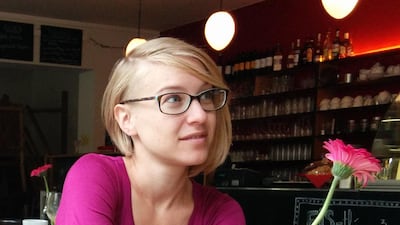When the TA First Translation Prize by the Society of Authors announced its first shortlist this January, it was no surprise to find Elisabeth Jaquette among the shortlist of six.
The new prize judges the first published books of debut translators, and Jaquette was shortlisted for her work on The Queue, by Egyptian writer, psychiatrist, and sculptor Basma Abdel Aziz.
Jaquette first came across the book in 2013, while living in Cairo. In 2014, she won a translation grant from English PEN, and her translation was eventually published by Melville House Press in 2016.
But The Queue, also longlisted for the 2017 Best Translated Book Award, "wasn't just my first book-length translation," Jaquette said, "it was my first translation of anything."
Since this auspicious start, Jaquette has carried work by 30-odd different Arab writers into English, including a graphic novel, a collection of poetry and aphorisms, and two novels.
She has two more forthcoming: Sudanese author Rania Mamoun's Thirteen Months of Sunrise (2018) and Dima Wannous's The Frightened (2019).
That’s not all: in the past year Jaquette also became the executive director of the American Literary Translators Association as well as one of the core members of Cedilla & Co, a new NYC-based collective for literary translators.
But among all this, Jaquette maintains her close relationship with the author of her first project. "A week after The Queue was published in English in the US, Basma told me she had started working on her second novel," Jaquette said. "I've been eagerly waiting to start translating it since then." The novel, Hona Abdan, launched at the Cairo International Book Fair this year.
For Jaquette, the translator-author relationship is about far more than translating words on a page. It’s also about using her connections in the United States to swing opportunities the author’s way. “On a practical level, that’s acting as agent for their book-length works, finding homes in English publications for their shorter works, connecting them to speaking opportunities in international festivals, facilitating residencies and grants for their work. With certain authors, Basma and Rania among them, I hope we have a career of collaboration ahead of us.”
Translators such as Jaquette have played a critical role in shaping what Arabic literature is read in English. This canon has been shaped by translators such as the late Denys Johnson-Davies, Salma Jayyusi, Humphrey Davies and Jonathan Wright, and it’s often they who determine what books reach readers.
Jaquette says she’s been commissioned by publishers, but most of her projects have been of her own choosing. First and foremost, she looks for books that are remarkable for their “style, storytelling, or how they interrogate the world”.
But she’s also looking to boost women’s voices. “The gender disparity in translated literature is well established,” Jaquette said. “According to Chad Post’s calculations at [the blog] Three Percent, female authors make up 29 per cent of all the translations published over the past 10 years. For Arabic, that number is even lower: 23 per cent. I aim to help shift that with my choices as a translator.”
Yet it’s not just about bringing more women’s books into English. Jaquette said it’s also about engaging with new ways of seeing women’s lives.
_________________
Read more:
‘Frankenstein In Baghdad' to be released in English: we speak to Ahmed Saadawi
Banipal Prize winner Robin Moger on the tricky art of translation
World Arabic Language Day: the fight to keep Arabic relevant
_________________
She said she doesn’t want to bring more books into our world “where women are foils for male characters, constantly sexualised, paper-thin stereotypes, or simply absent.”
Instead, she said, she’s interested in stories that “interrogate, frame, or describe the world in ways we haven’t read before, and in books that are enthralling reading experiences.”
On March 1, Jaquette will learn if she’s won the TA First Translation Prize, established by Daniel Hahn with his own literary-prize money. And what if Jaquette received a windfall of cash? She’d create a residency for author-translator-editor teams.
“Last summer, I was in London presenting at the Shubbak Festival. The day before Rasha Abbas and I presented a bilingual performance of her new work, we stole away in a room in the British Library along with Alice Guthrie. It was a magical experience. I realised that for all the hundreds of hours I’ve corresponded with authors and editors on a text, we’d never done that work in person.”
There are residencies out there for author-translator teams. But having the editor in the room would enrich the conversation even further, Jaquette said.
Her next translation to arrive in bookshops will be Rania Mamoun's Thirteen Months of Sunrise, which should be available this spring.
Mamoun is a Sudanese fiction writer, journalist and activist whose work Jaquette first discovered when she was asked to translate a story for the collection Book of Khartoum.
But Jaquette doesn't want you to read the book to learn about Sudan. While it's good for readers to expand their mental landscapes, she said, that's not why you should read Thirteen Months.
"I want readers to pick up her fiction because it's great storytelling."

